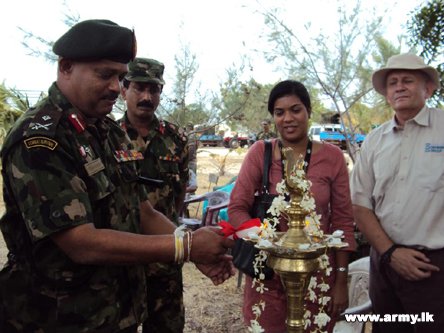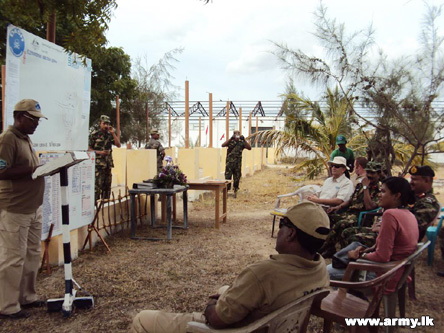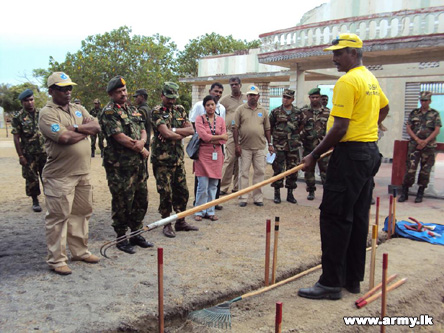The current demining projects in the north were to have more and more teeth as one more Non Governmental Organization (NGO) joined the bandwagon in order to expedite and further expand ongoing humanitarian demining roles, following an initiative taken by Security Forces Headquarters, Kilinochchi.
The latest and the newest NGO, Delvon Assistance for Social Harmony (DASH) with a team of about 29 deminers a few days ago inaugurated its maiden project in areas surrounding the strategic Elephant Pass at the request of the Army deminers, pioneers in the sphere of demining since the government is prioritizing the reopening of the defunct Elephant Pass saltern.
DASH team, spearheaded by its Programme Manager, Brigadier Ananda Chandrasiri (Retd), a reputed former Engineer Officer in the Army, has earlier cooperated with the Danish Demining Group (DDG) before the DASH began operational on its own as the requirement for speedy excavation of mines was fast swelling.
The inaugural occasion at the old saltern complex in Elephant Pass adorned ceremonial garbs as Major General Chandana Rajaguru, Commander, Security Forces– Kilinochchi, Ms. Dulani Sirisena, Senior Programme Officer of AusAID, Mr. Chris Bath, Country Programme Manager – Danish Demining Group (DDG) Sri Lanka, Mr. Mark Livingstone, Operations Manager – DDG Sri Lanka, Lieutenant Colonel Deepal Subasinghe (Retd), Chairman - DASH and a number of state officials, military officers and officials of various mine action organizations, assembled at the venue to extend their greetings to the new partner in demining.
Sri Lanka Army identified the area and requested the new organization to prioritize the specified area.
This first independent demining assignment is funded by AusAID, the Australian government’s wing for international development assistance. Brigadier Chandrasiri (Retd) in his brief address to the occasion appreciated the DDG’s support for grooming DASH and explained its availability of expertise and experience at every level of its organizational structure to carry out its responsibilities in conformity with expectations of the government.
The Elephant Pass saltern which has a land mass of over 1,600 acres had significantly contributed to the country’s salt production until it ceased to function in 1990 with the escalation of LTTE hostilities. At the time of its closure, the saltern had 300 permanent employees and 200 casual workers in addition to a seasonal workforce of about 1,500 men and women.
The government, determined to boost the economy has planned to recommence the production process as early as possible providing a number of much-needed job opportunities for newly resettled people.
 |
 |
 |
 |

